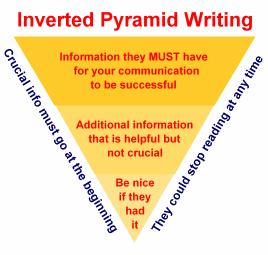Day 14: NaNoWriMo {I Write How I’m Trained}
I remember my first edit for my first article for the high school newspaper. You could barely see the original text through the edit (as is the case with first edits), but I picked up on something.
“How come you moved everything to the first paragraph?” I asked my editor. I’d placed important details throughout the piece to keep readers going, but her edit put the who, what, where, when, why, and how at the top.
“Because most people won’t read past the first paragraph.”
Journalism refers to this as the “inverted pyramid.” It’s a hard lesson to learn – not because it’s hard to do, but because it’s hard to swallow. You will spend hours working on an article, and most people won’t read past the first paragraph, or as this graphic puts it: “They could stop reading at anytime” (duh, duh, duh) …

And if you wrote an article that “jumps” and requires the reader to turn the page or click to “Read More,” you can forget about it. It’s not personal, it’s business, and it’s a Journalism 101 lesson because those who can’t deal need to choose another discipline.
Do you know what’s worse? Technical editing. My first job after college was editing online help files for debt collection software. The technical communicators who wrote the files were guaranteed an audience of one – their editor – and beyond that, we were pretty much guaranteed an audience of none. Let’s take a tally: When was the last time you read a help file?
There’s the audience of none.
When I say I write how I’m trained, I’m talking about writing with this mindset vs. technical skill. For four years in college, I wrote against the knowledge people could stop reading at any time, and for five years after college, I wrote against the knowledge that no one was reading. I write with a fighter’s mentality – fighting to keep my audience’s attention with each paragraph, each page, each chapter. It keeps me sharp, and it keeps me surprised, as in I’m always surprised when people tell me they’ve read Lu all the way through. It’s not because I’m insecure about what I wrote but because they could have stopped reading at anytime. Or they could have never read it at all because my book was one in a million books published in 2017. That’s a lot of product to choose from.
How my training plays into my writing voice is like this: I will always write at a steady clip. You won’t get long chapters or consecutive paragraphs of description. I will break into dialogue as much as I can get away with, and I will alternate light with heavy like salty and sweet because it keeps you reading. I wanted to write a book you could read in a day because what if you don’t have more than a day? I rarely do. Shoot, I’ve been making like such an old girl this semester that I rarely have more than 5 minutes before a book sends me to sleep. Someone please write a book I can read in that timeframe.
There are limitations to this style. Enter my writing buddy, who is my opposite in personality and writing approach. If it weren’t for Laura, you would never have caught your breath in Lu. I feel too much pressure to keep the train moving, and I learned to trust Laura to tell me when to slow down because the reader needed to linger for a moment. A perfect example of this is on Chapter 8, page 70, when Lu is covering her third wedding:
I crisscrossed my way up the deck stairs and through the maze of tables and soft clinks of people eating and drinking to the bar set up beside the french doors leading into the house. I smiled at the other people in line but turned to look at the party instead of attempting small talk. The white tablecloths with white rose centerpieces and white candles and twinkle lights all around made for such a pretty scene that it felt more like a bridal magazine shoot than a wedding. And then I laughed, because of course it was both, and I was the journalist covering it. The summer evening carried a light breeze, and I closed my eyes to tune into the stringed music playing softly through speakers camouflaged in the landscaping. I had no idea what Ashley’s first wedding had been like, but her second was lovely.
I wouldn’t have written this if Laura hadn’t pushed back with, “I have no sense of what this wedding is like. What is Lu seeing? What is Lu hearing?” She was right, and I can tell you it took me longer to write that paragraph than the rest of the 13 pages in that chapter.
Your writing voice comes with strengths and limitations, and wielding it well is about playing to your strengths while shoring up your limitations. In writing Lu, I turned it into sort of a game. After I’d write a chapter, I’d revise it before sending it Laura, specifically to see if in that chapter I could make her see, hear, feel, smell … something, just one thing (I didn’t set the bar too high) because I know if she did, she’d comment, and if she commented, I’d give myself a mental gold star.
Write about something today on Day 14 of NanNoWriMo. Make it something simple and something you know, like breakfast. If Laura were to write about breakfast, you’d taste it. If I were to write about breakfast, you’d read an event. If you were to write about breakfast? We don’t know because you haven’t written it yet! Write it down. See if you can catch your defaults. It just might be that these form the tones of your writing voice.



